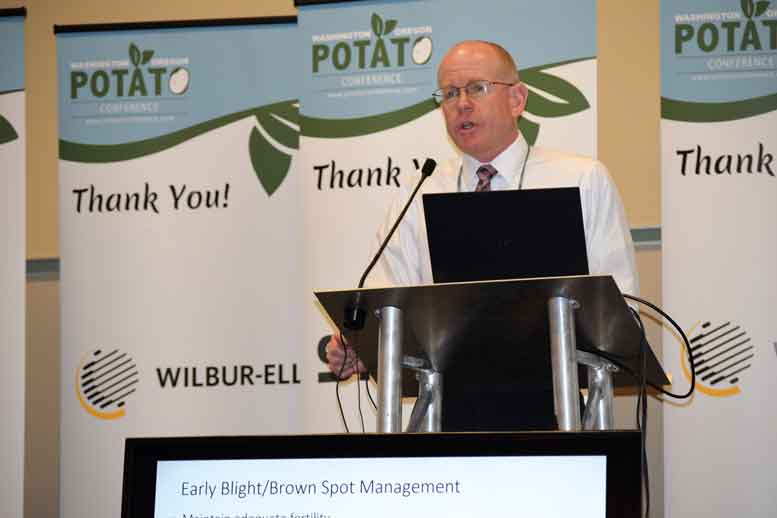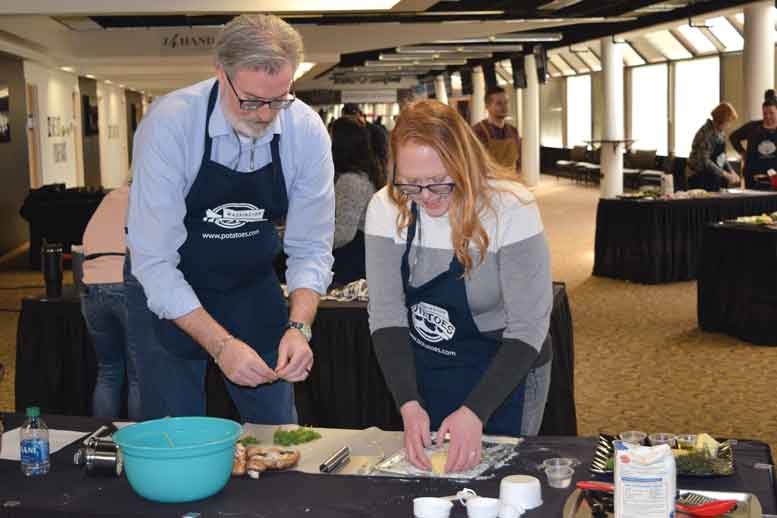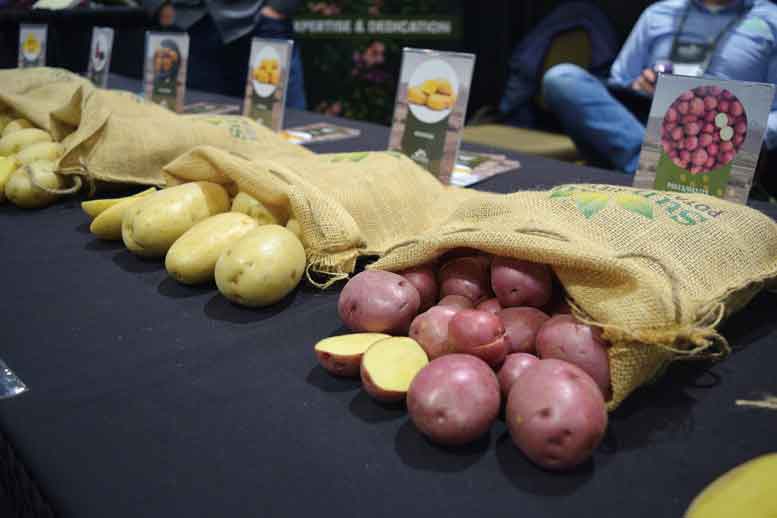|
Click to listen to this article
|
Story and photos by Denise Keller, Editor

At the Washington-Oregon Potato Conference, held Jan. 24-26 in Kennewick, Washington, amidst an agenda stacked with research presentations, one presenter set out to take the audience on an emotional journey. Keynote speaker Howard Goldstein began with a warning that he would rattle the audience and elevate their blood pressure with negative news about potatoes. But he also promised to simmer down the crowd by sharing how research is changing the public’s perceptions about potatoes.
Goldstein, the founder of NomNomGlobal Food & Nutrition Services, has been working with the Alliance for Potato Research & Education (APRE) for the last seven years. The nonprofit organization is dedicated to advancing the scientific understanding of the role white potatoes play in promoting health through funding research that includes all types of potato preparation (baked, boiled, fried and frozen). The group has been working to push back against misperceptions about potatoes for 10 years.

Many of these misperceptions continue to be perpetuated by individuals Goldstein refers to as “nutrition science influencers,” members of advisory boards who make policy and food regulation decisions and directly influence nutrition guidance. In his keynote address, Goldstein pointed out three key misperceptions and discussed research that is being used to correct each myth.

Myth #1: Potatoes Are Not Vegetables
Some influential nutrition scientists and institutions don’t think potatoes are vegetables and want to move potatoes outside the vegetable category to their own category or lump them in with refined, sugary grain foods, according to Goldstein.
In observational research, which makes associations between lifestyle, food choices and health outcomes, potatoes are often excluded from the vegetable category. Instead, they’re grouped with refined grains and sugars or considered part of a “western-style diet,” which includes red meat, sugar and butter. Research findings are then mistakenly interpreted as “don’t eat potatoes,” Goldstein said. An increasing number of nutrition science recommendations are singling out potatoes and recommending that consumers limit potatoes.

“We cannot let this happen. We cannot let potatoes be moved out of the vegetable category or the starchy vegetable category. Potatoes have to retain their vegetable classification. But this is the reality we’re dealing with today,” Goldstein said.
APRE points to a plethora of research proving that a potato is a nutrient-dense vegetable and not a grain. Some of these studies show that health outcomes of eating potatoes match more closely with starchy vegetables and non-starchy vegetables and have nothing to do with grain foods.

Myth #2: Glycemic Index is Carb Quality Gold Standard
The reason some nutrition scientists think that potatoes are not a vegetable comes down to the issue of carbohydrate quality, Goldstein continued. Influential nutrition researchers believe that glycemic index (GI) is the gold standard to measure carb quality, which he said is really odd, using this example to illustrate.
“If you were to give yourself or your kids a snack one day and you used the glycemic index as that guide, you would say ‘Peanut M&Ms have a low GI and so do Snickers, so I’ll give that to my kid for a snack instead of a slice of watermelon or a baked potato,’” Goldstein said. “And that is where logic flies out the window. How does this make sense? It really doesn’t.”

Glycemic index, as well as the four other indexes used in the research community to identify high quality carbs, only looks at three components: total carbs, sugar and fiber. The Quality Carbohydrate Coalition, a group spearheaded by Potatoes USA, is working to develop a measurement of carb quality that also takes into account the other essential nutrients that carbohydrates can deliver.
The use of glycemic index to measure carb quality is really the domino that needs to fall, Goldstein said. He mentioned research that demonstrates that GI is not a good marker for carb quality, including studies that show that glycemic index has no impact on health outcomes such as weight, blood pressure, diabetes or heart health.

Myth #3: Adding Anything to Potatoes Negates Nutrition
Moving on to the final misperception, Goldstein said it’s believed that “if you add anything to a potato, it’s no longer nutritious and it’s going to kill you.” Adding oil or salt to other veggies seems to be fine, but not a potato.
When it comes to potato preparation, much of the research fails to take into account what else the study participants are eating or doing. Often, a health outcome is tied to the background diet or lifestyle more than an individual food. For example, in an APRE study that tested the difference between snacking on almonds – which Goldstein described as the darling of the nutrition world – and French fries, researchers found that based on the study’s outcomes of interest, eating fries is the same as eating almonds. It’s not one food that’s causing poor health outcomes; it’s all that the individual is eating or doing.
Science from APRE is helping push against and get ahead of misperceptions in potato nutrition dialogues, Goldstein said. The organization is using research to prompt media to correct inaccurate reports about potatoes. Progress is being made, but there’s more work to be done.

